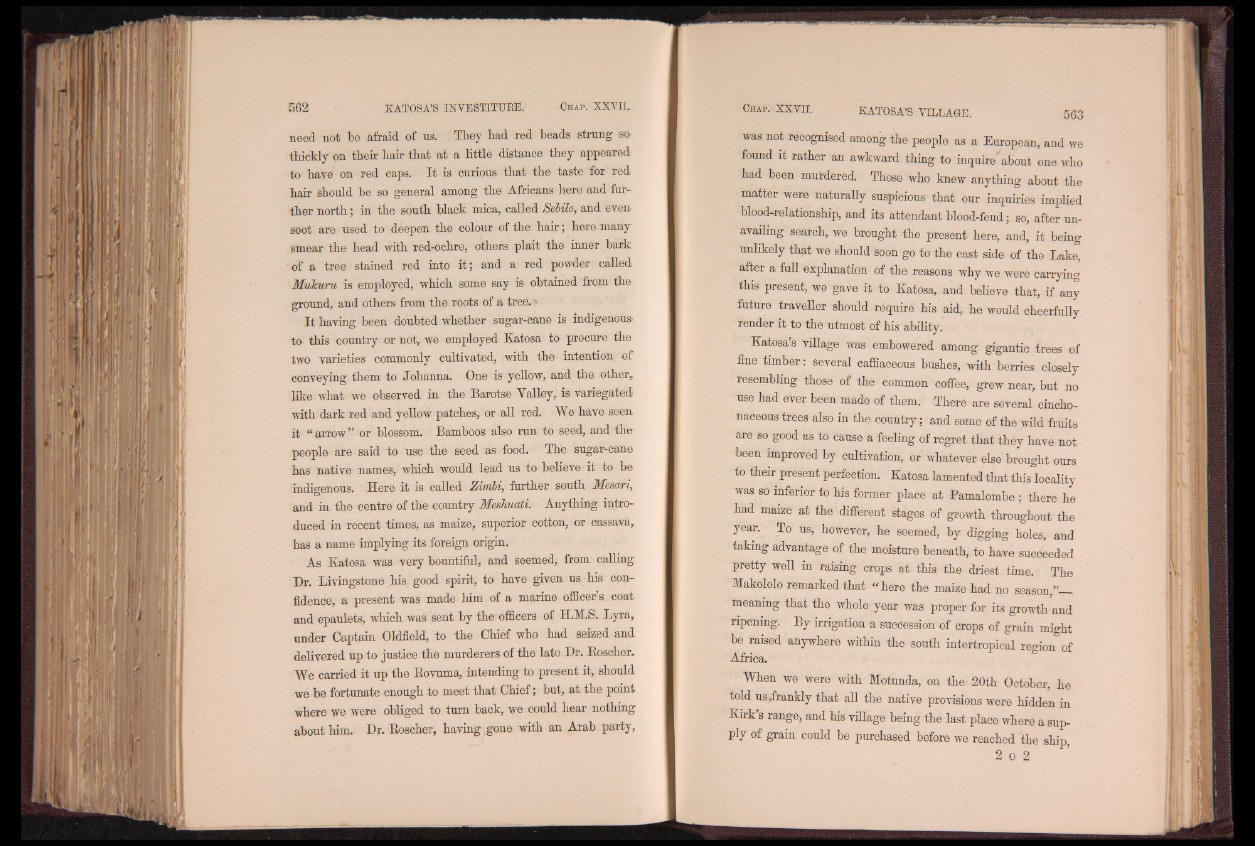
need not be afraid of us. They had red beads strung so
thickly on their hair that at a little distance they appeared
to have on red caps. I t is curious that the taste for red
hair should be so general among the Africans here and further
north; in the south black mica, called Sebilo, and even,
soot are used to deepen the colour of the hair; here many
smear the head with red-ochre, others plait the inner bark
of a tree stained red into it; and a red powder called
Mubiru is employed, which some say is obtained from the'
ground, and others from the roots of a tree.I
I t having been doubted whether sugar-cane is indigenous-
to this country or not, we employed Katosa to procure the
two varieties commonly cultivated, with the intention of
conveying them to Johanna. One is yellow, and the other,,
like what we observed in the Barotse Valley, is variegated
with dark red and yellow patches, or all red. We have seen
it “ arrow ” or blossom. Bamboos also run to seed, and the
people are said to use the seed as food. The sugar-cane
has native names, which would lead us to believe it to be
indigenous. Here it is called Zimbi, further south Mesari,
and in the centre of the country MesJiuati. Anything introduced
in recent times, as maize, superior cotton, or cassava,
has a name implying its foreign origin.
As Katosa was very bountiful, and seemed, from calling
Hr. Livingstone his good spirit, to have given us his confidence,
a present was made him of a marine officer s coat
and epaulets, which was sent by the officers of Il.M.S. Lyra,
under Captain Oldfield, to the Chief who had seized and
delivered up to justice the murderers of the late Hr. Roscher,
We carried it up the Rovuma, intending to present it, should
we be fortunate enough to meet that Chief; but, at the point
where we were obliged to turn back, we could hear nothing
about him. Hr. Roscher, having gone with an Arab party,
was not recognised among the people as a European, and we
found it rather an awkward thing to inquire" about one who
had been murdered. Those who knew anything about the
matter were naturally suspicious that our inquiries implied
blood-relationship, and its attendant blood-feud; so, after unavailing
search, we brought the present here, and, it being
unlikely that we should soon go to the east side of the Lake,
after a full explanation of the reasons why we were carrying
this present, we gave it to Katosa, and believe that, if any
future traveller should require his aid, he would cheerfully
render it to the utmost of his ability.
Katosa’s village was embowered among gigantic trees of
fine timber: several caffiaceous bushes, with berries closely
resembling those of the common coffee, grew near, but no
use had ever been made of them. There are several cincho-
naceous trees also in the country; and some of the wild fruits
are so good as to cause a feeling of regret that they have not
been improved by cultivation, or whatever else brought ours
to their present perfection. Katosa lamented that this locality
was so inferior to his former place at Pamalombe; there he
had maize at the different stages of growth throughout the
year. To us, however, he seemed, by digging holes, and
taking advantage of the moisture beneath, to have succeeded
pretty well in raising crops at this the driest time. The
Makololo remarked that «here the maize had no season,
meaning that the whole year was proper for its growth and
ripening. By irrigation a succession of crops of grain might
be raised anywhere within the south intertropical region of
Africa.
When we were with Motunda, on the 20th October, he
told us frankly that all the native provisions were hidden in
Kirk’s range, and his village being the last place where a supply
of grain could be purchased before we reached the ship,
2 o 2